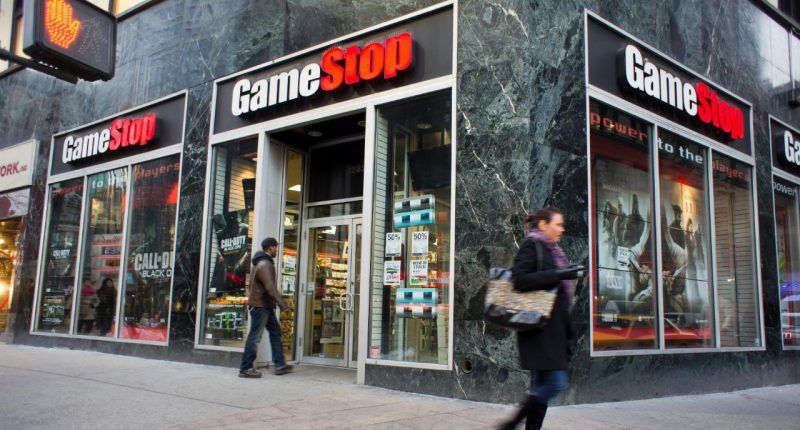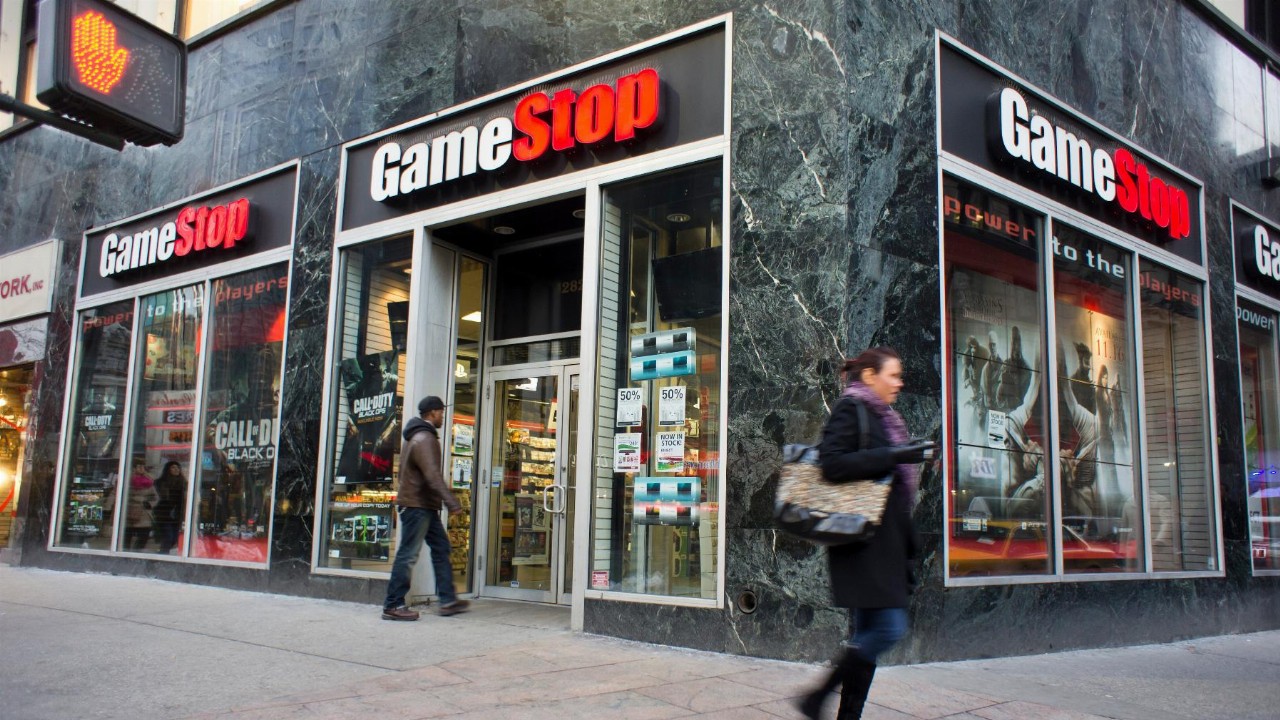- Shares in GameStop, the embattled brick-and-mortar gaming company, have shot up more than 1600 per cent since January 12 — so what happened, and is it legal?
- An incredibly complex story can be boiled down to an influx of retail investors thanks to the Reddit forum WallStreetBets and its 2.8 million users
- Melvin Capital Management had been gathering a weighty short position in the company that was quickly discovered by Redditors, who piled on and sent GameSpot’s shares blowing past its all-time high
- Unable to execute its short, Melvin lost more than $2 billion in a matter of weeks and was forced to accept a bailout from two other funds
- The term “market manipulation” was quickly bandied about, but due to the nature of Reddit and the retail investor landscape, it’s not quite as simple as that
- So who, if anyone, broke the law, and what happens now?
It began like this: Reddit — more specifically the sub-reddit WallStreetBets and its roughly 2.8 million users — piled onto the GameStop bandwagon while waving a letter penned by Ryan Cohen, founder of Chewy (which was acquired by PetSmart in 2017 for $3.35 billion) and a significant holder of GameStop stock.
If for some reason you’re not familiar with GameStop, the company — at least before this all happened — was more or less done. It’s the Blockbuster of the gaming world; once successful but now left behind for its failure to adapt to an increasingly online world. Ryan’s letter, published on November 16 last year, had no shame in pointing out these facts, saying:
“Unfortunately, it is evident to us that GameStop currently lacks the mindset, resources and plan needed to become a dominant sector player. The company remains in long-term secular decline due to its apparent unwillingness to pivot with urgency and grow with gamers.”
Ryan Cohen, November 2020
And:
“Through our private conversations, we have explained to Mr. Sherman and the Board that GameStop has the ability to pivot toward becoming a technology-driven business that excels in the gaming and digital experience worlds. But this pivot requires the type of strategic vision that has not yet taken hold in the c-suite or boardroom of the company.”
Ryan Cohen, November 2020
Ryan, however, wasn’t the only one to recognise GameStop’s shortcomings. Melvin Capital Management — a multi-billion-dollar hedge fund — had been gathering a weighty short position in the struggling business. Usually, funds are under no obligation to disclose their short positions, but some of the more astute Redditors discovered that these were “listed put options” to the value of more than $55 million.
It took no time at all for these Redditors to begin buying up GameStop shares as a “short squeeze” against Melvin, refusing to sell with such slogans as “we can remain retarded for longer than they can stay insolvent!” and demanding higher prices.
An aside: What is a short squeeze?
In the world of finance, a “short” is an investment strategy that looks to capitalise on the decline of a stock’s price.
For example, Investor A has five shares collectively worth X amount. Investor B — the greedier of the pair — asks to borrow those shares in the belief that their value will fall and they can buy them back at a cheaper price before giving them back to Investor A, pocketing the difference in the process.
However, Investor A has cottoned on to Investor B’s strategy and decided to buy all of the shares on the market, leaving Investor B with no choice but to buy from Investor A in order to return what they borrowed.
The theory here is that, should Investor A hold strong, the price of the shares will go up.
Back to it…
The short squeeze, combined with an overwhelming surge in retail investors, sent GameStop’s shares blowing past its previous all-time high with more than a 1,600 per cent increase since January 12. Meanwhile, Melvin — unable to execute its short — lost more than $2 billion in roughly the same period of time and was forced to rely on a bailout from two other funds, Steve Cohen’s Point 72 and Ken Griffin’s Citadel.
One particular protagonist, a Reddit user (whose name is too impolite to print), purchased $50,000 worth of call options and is now sitting on a hefty profit of more than $13 million.
So, who’s to blame?
According to those more in-the-know than the rest of us, the short answer is no one. While there’s evidently a few underhanded things going on, none of it might actually be illegal, for a number of reasons.
First, and most importantly, there is no precedent. Never before has there been such a massive convergence between the meme-swinging hooligans of the internet and the cosmetically more refined but equally ruthless powerhouses on Wall Street. Financial regulators are flying blind.
Second, there would have to be a degree of evidence that points to market manipulation, which in itself is so broad it’s often difficult to pin down an exact definition. Tom Swiers, from the U.S. Securities and Exchange Commission’s Office of International Affairs, defined it as “intentional or wilful conduct designed to deceive or defraud investors by controlling or artificially affecting the price of securities.”
So, if someone buys a stock with the intention to push up the price so that others will buy it, that’s market manipulation. But if someone buys a stock hoping that the price will go up and others will buy it, well that’s just everyday investing. There’s a key difference, but practically speaking the two are the same.
In theory, it would have been possible for a Redditor to have posted manufactured rumours about GameStop, but if they had, those posts are now buried deep in one of the most active and frankly intolerable parts of the internet — the online equivalent of a plane’s blackbox at the bottom of the Atlantic.
What has been identified — as Matt Levine, a columnist for Bloomberg Opinion, pointed out — is that many of the Reddit posts appear to be either substance-free — “GME to $1000” — or arguments that combine publicly available information with personal opinion and speculation about the future. They might be inaccurate or exaggerated, but they’re not, as Matt says, core fraud.
Essentially, there’s very little deception. No one appears to have spun GameStop’s fundamentals in such a way that others might be tricked into investing, and no one seems to have been under the impression that the company had profoundly impactful backing from institutional investors.
Think back to Ryan Cohen’s letter. One would have to be a very special kind of idiot to interpret the fact that “sales have plunged from $9.5 billion in fiscal year 2011 to $6.4 billion in fiscal year 2019” as an immediate investment green light without taking the time to consider a deeply complicated long-term play. The same goes for his assertion that “net income has fallen off a cliff from $339 million in fiscal year 2011 to a staggering loss of $470 million in fiscal year 2019.”
It would therefore seem that GameStop’s brain-splitting share price rally was simply the result of an honest pump, albeit on a mammoth scale.
Had the Redditors been institutional investors, the SEC may be able to go after them on grounds of collusion, but that would require proof of a highly coordinated effort, among other more detailed things.
The internet is a great many things, but “coordinated” is rarely, very rarely, one of them.
What happens now?
That, really, is anyone’s guess. What is certain, according to Nigel Green, Chief Executive and Founder of deVere Group, is that retail investors are playing a dangerous game.
“I would urge investors to exercise the utmost caution before joining social media-led stock frenzies of this nature. The valuations can be expected to be extremely wild — in both directions — and there’s a legitimate risk that investors could get burned,” he said.
The GameStop story is being pitched as a David vs. Goliath affair, with one Redditor posting “Hey mom I can’t come for dinner. I’m bankrupting a 10-figure hedge fund with the boys.” And war — as The Temptations told us — is good for absolutely nothing.
“Any potential bursting of bubbles is likely to be within specific stocks, so unlikely to rock the global financial markets as has happened previously — but individual investors could still be caught off-guard,” Nigel continued.
“Micro-bubble spotting, and diversification across asset class, sector, region and even currency, should become a priority for investors right now.”







